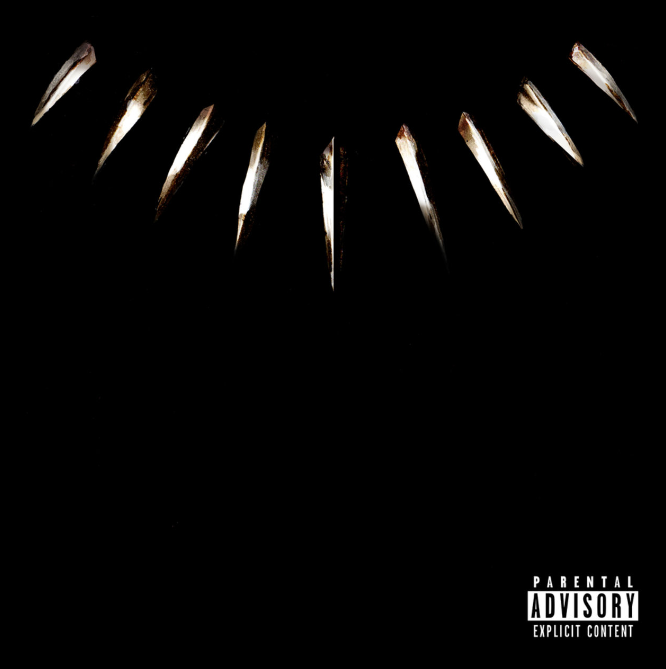It’s easy to understand how and why Black Panther would appeal to Kendrick Lamar. The Marvel comic book movie and its script, by director Ryan Coogler and screenwriter Joe Robert Cole, are dense with what one imagines would be thematic catnip for K.Dot: early 1990s inner-city California, heroism as identity, complex family dynamics, afrocentric historical awareness, all-black everything, loyalty, the reluctant assumption of a vacant throne no one else is qualified to occupy out of sheer necessity. Given the year that Top Dawg Entertainment just had–SZA’s Ctrl turning her into a star, Lamar’s DAMN! extending a dynamite cultural streak—Black Panther: The Album could have doubled as a stealth TDE State of the Union address, a way to spotlight the label’s emerging and less celebrated voices.
Instead, Lamar, Coogler, and TDE CEO Anthony Tiffith opt for a lean and sinuous (semi-corporate) victory lap that emphasizes TDE’s growing reach and influence: Future! The Weeknd! James Blake! (Better luck next time, TDE artists SiR and Isaiah Rashad.) Arguably, The Album is Lamar’s show—credited or not, he spits or ad-libs on nearly every track. But unlike Lamar solo albums such as good kid, M.A.A.D City or To Pimp A Butterfly, The Album isn’t handcuffed to a through-line, and so it’s free to be capricious and fun, even in a way that other TDE albums like Ab-Soul’s Control System and Schoolboy Q’s Blank Face LP weren’t exactly. Larger-than-life bookends majestically underscore the cross-promotional, soundtrack-adjacent realities at play: the title track echoing with dusky pianos and dramatized plot points, and the suave, vaguely apocalyptic “Pray for Me” widening the scope to include the desperate, non-fiction dystopias where most of us actually have to live.
Between those poles is an austere, expensive urban-pop clinic where every participant knows what to bring to the table. On “X,” where producers Illmind and Sounwave approximate a 2001-era Dr. Dre beat, the mood’s playful: South African artist Saudi lays on his sauciest patois, while Schoolboy Q and 2 Chainz smirk through abbreviated autobiographies. On “Bloody Waters,” Anderson .Paak waxes Darwinian and Ab-Soul leans militant, while if the languid and love-stoned “The Ways”—where Khalid and Swae Lee pass the mic to serenade distinct ideals of romance—seems to breeze in from Drake’s More Life, it certainly isn’t unwelcome or out of place. The terse, scarred “Opps” lends Vince Staples and Johannesburg-based newcomer Yugen Blakrok scenery to chew over production consisting of splintered percussion and klaxoning synthesizers; like a grime remix of a Downward Spiral-era Nine Inch Nails single, it makes for a mesmerizingly cold few minutes. On the warmer end of things, singer Jorja Smith liquifies a smoldering blues on “I Am” while the sweet, sweeping “All the Stars” catapults SZA’s hopeful wonder and Lamar’s pointed hauteur to Alpha Centauri.
For all the deft, varied professionalism on display here, Lamar’s omnipresence on Black Panther: The Album might be its most compelling feature. He ambles in and out of songs like a hype-man or an over-attentive party host, moving conversations in fruitful directions, topping off drinks, leading or reigniting metaphorical conga lines; it’s a sly extension of what he was getting up to in the margins of 2016’s demo collection untitled unmastered. One moment he adopts a preacher’s cadence; the next he’s juicing a chorus for his collaborators or intoning bits of Black Panther dialogue or locking into the mantra-like repetition of one phrase or another (“Fuck the place up / Fuck the place up / Fuck the place up”).
In playing the anchor, Lamar can seem more like an especially gifted sketch improv performer supporting his team than a rap superstar solidifying one of the year’s biggest movie soundtracks. That casualness—that humbleness—bodes well for the future of this Hollywood franchise, this franchise-affiliated icon, and everyone along for the ride. Here in the present, though, Black Panther: The Album feels destined for vibranium-enhanced ubiquity; expect to hear it emanating from earbuds, PA systems, and passing cars well into the summer.





